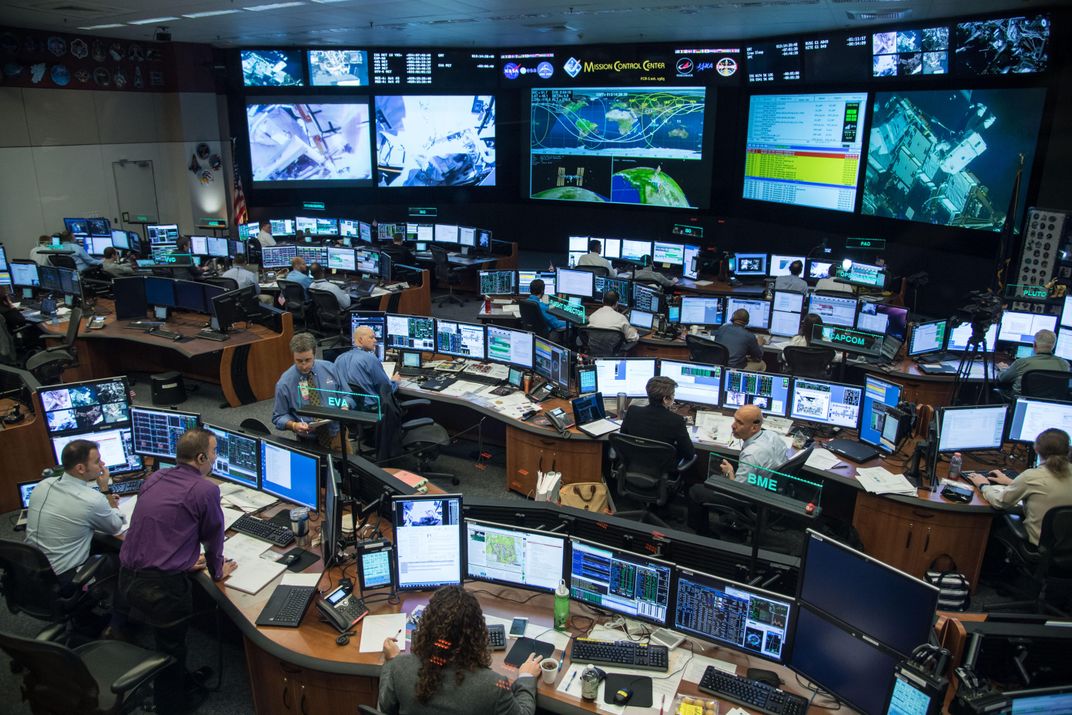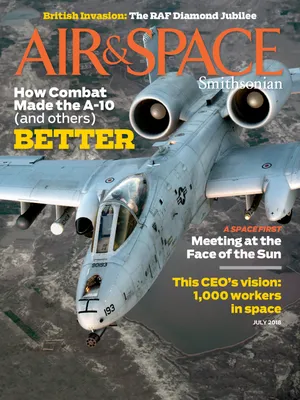We Control the Space Station
Lauren Cooper, International Space Station Operations Engineer, Johnson Space Center, NASA.
/https://tf-cmsv2-smithsonianmag-media.s3.amazonaws.com/filer/a7/d9/a7d99b9d-db45-45d5-9113-a166df1f1440/01i_jj2018_brandideanlaurencooper_live.jpg)

Cooper and her colleagues do mission planning, analysis, and real-time operations of the station’s motion control system.
The job: Attitude Determination and Control Officer. The International Space Station is a spacecraft, which is ordinarily controlled by onboard software. During dynamic events, however, such as spacecraft rendezvous and crewed dockings and undockings, it must be controlled by operators in Mission Control. It is constantly crewed, with three to six in residence at any given time. People may not realize, says Cooper, what dockings with supply ships or crew ships require. “We may need to turn the ISS to fly backwards or belly-forward so the approaching spacecraft can reach a certain docking port. For the most part, we start the planning process well in advance. It’s not a sprint for us, it’s a constant marathon. We’ll get the balls rolling months out to prepare for which vehicles will be at which ports. As you get into the final weeks, that’s when all the sub-system specific analysis and timing constraints will come in.”
Best thing about the job: “Working the crew undocking. The ISS maneuvers to the undocking attitude, the Soyuz fires thrusters as it moves away, and then you watch for three hours as the crew takes their trip home. They go through a pretty violent return to Earth. They’re in a ball of plasma going through the atmosphere, and then they touch down. One of the most exhilarating and emotional things for me is knowing that I played a part in humans coming home.
“When you’re new, you work the night shift, but that’s actually when the crew and the Russians are awake, and it’s essentially a full workday in the middle of the night. And the cool thing is, during the crew workday, they turn the cameras on inside, so you can see them spinning around and floating through—doing all their normal work. You’re down at your desk on Earth working toward the same goal. Another thing: It’s a very small group of people who have the opportunity to do what we do. It’s a privilege to work in such an elite environment.”
Training for the job: A two-year training program is required for ISS operations engineers. “The first year is technical training, and you basically get a master’s degree in the motion control systems of the International Space Station,” says Cooper. “That’s anywhere from learning ISS-specific reference frames to learning the hardware and control software of the ISS.”
The first year is spent in a series of classes and interim tests leading to one big comprehensive test at the end. “Once you pass that, you go into simulations,” Cooper says. “You go into these eight-hour simulations where they throw cascading failures at you to test how you respond in high-stress environments…and it can really break you down. It’s pretty psychologically draining.
“There are failures that can occur that will put the crew or station in danger, and our job is to work as a team to assess those risks and respond. They’re really interactive. The trainers are assessing how people respond together to the situations they create so the training can provide feedback. Once you pass a series of simulations, that’s when you are certified to sit in Mission Control.”
How did you become interested in spacecraft? “I’ve been obsessed with NASA since I was little. My room was decorated in an alien theme. My dad is a private pilot and my grandpa was in the Air Force, so I’ve always had this love of flight. I was lucky enough when I was in college to take my dad to the final space shuttle launch. I cried, it was such a moving experience, and I think that’s what solidified my fate, that I wanted to work for NASA.”
I like how you put that: “It solidified my fate.” “I know. My dad was like, Cool it. It was really cool though, to see human beings being propelled into space. There’s nothing like it.”
The path: During her junior and senior years at the University of Texas at Austin, where she earned a degree in aerospace engineering, Cooper did research for NASA-funded projects and became interested in NASA missions. “I reached out to a woman who was the CEO of a small-contracts company that worked for NASA. I wanted to know what it was like being a woman in the industry and how she started her own company. It turned out that her company hired flight controllers. She put me in touch with some of the guys who worked in Mission Control, and from there I knew I had to have this job.”
What’s it like watching movies about space? “It’s completely ruined for me. I still love it, but I’m like ‘That couldn’t happen. That’s not right.’ Armageddon, I’m looking at you. I’m like: You guys got everything wrong!”
